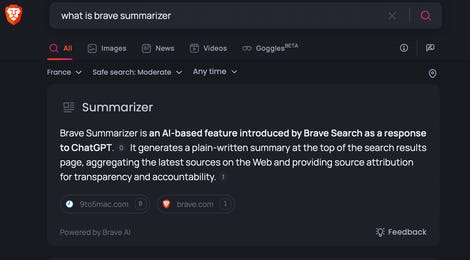Privacy-oriented browser maker Brave has launched an AI feature called “Summarizer” for its search engine.
Brave launched its search engine two years ago after acquiring search engine Tailcat. The company has pledged to take on Google with a focus on privacy and an independent search index – rather than relying on, say, the Bing search index of Microsoft, as did DuckDuckGo.
Today, in response to the success of large language models (LLMs) such as Microsoft-backed OpenAI’s ChatGPT, Brave is launching Summarizer on Brave search, which the company assures is not based on ChatGPT.
“Concise and direct answers at the top of the results pages”
Summarizer looks a bit like Google featured snippets descriptions on a results page, which indicate the source of the information. Google changed this feature last year to prevent summaries based on false information. But, according to Brave, while the Summarizer uses LLMs, it’s not prone to the quirks of other AI chatbots.

Picture: Brave
Brave says its Search Summarizer “provides concise, direct answers at the top of Brave Search results pages, in response to user input, based solely on web search results.”
The company adds: “Unlike a purely generative AI model, which tends to spout unsubstantiated claims, we have trained our large language models (LLMs) to process multiple sources of information present on the web. produces a more concise and precise answer, expressed in coherent language.”
Brave does not work with ChatGPT
Like Bing Chat and Google’s featured snippets, Brave cites the data source in its summaries and provides links to that source.
“Unlike AI chat tools that can provide fabricated answers, Summarizer generates a plain text summary at the top of the search results page, aggregating the latest sources from across the web and providing source attribution. “said Josep Pujol, head of research at Brave, in a press release.
Brave clarifies that Summarizer is “not powered by ChatGPT or its back-end systems.” The company uses three different MLLs, trained in different tasks, including answering questions, “zero-shot” learning (the ability to follow instructions), and a model designed to paraphrase an entry.
Cautious approach to LLMs
Despite this new feature, Brave doesn’t think LLMs will be useful for all research tasks.
“Although the industry generates a lot of hype around AI, at Brave we are not yet convinced that LLMs can replace search as we know it. However, if used correctly, these new templates can help the user navigate the results, which is the approach we follow with Summarizer Chat-like interfaces are not yet proven, and as of today we remain skeptical of their usefulness For all research tasks.
While Brave believes MLLs won’t change search much, the company believes that it’s in the browser where LLM’s wizard-like capabilities will be “truly fruitful and game-changing.”
Source: “ZDNet.com”
